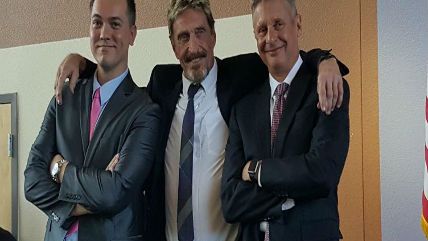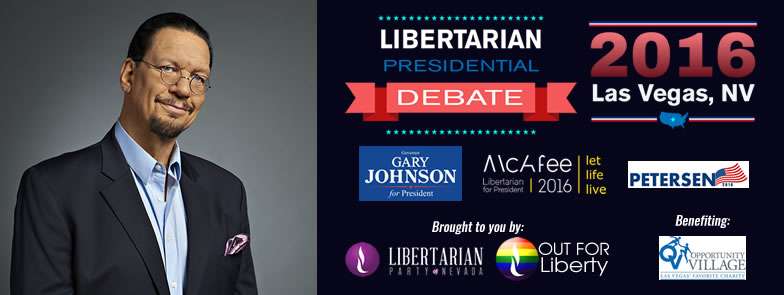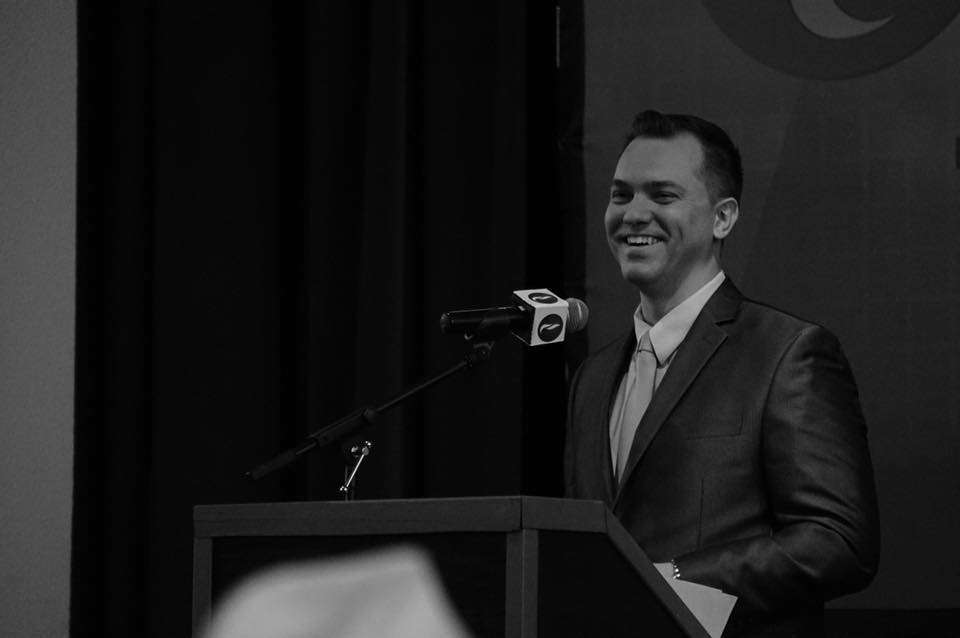Libertarian Candidates, Moderated by Penn Jillette, Debate in Las Vegas
Anti-discrimination fights and debate disses shape the last pre-convention debate of leading Libertarian Party presidential candidates.

The Nevada Libertarian Party worked hard to put together a prominent forum for the three leading presidential hopefuls in a debate held yesterday in Las Vegas. The debate, featuring former Republican Gov. Gary Johnson, movement activist and Libertarian Republic founder Austin Petersen, and antivirus software legend John McAfee, was moderated by noted stage magician and libertarian Penn Jillette, known professionally as just "Penn." (The event, whose attendance I estimate at around 300, was also a fundraiser for Penn's favorite charity, Opportunity Village, which provides opportunities and aid for the intellectually disabled.)
McAfee, after patiently and effectively participating through the multi-hour four-part debate, chose in his closing remarks to attack the very concept of it. "You may think you learned something by watching this debate. I assure you you have learned nothing at all." He then attacked the polished soundbite culture and canned answers of debates and hinted at the complicated truths they obscured. (He also used language unfit for most TV twice in this closing statement.)
I disagree with McAfee that the average viewer would "learn nothing" from the debate.

It is scheduled to be aired later this week on Glenn Beck's The Blaze network—numerous times, Nevada's L.P. Chair Brett Pojunis, who wrangled the event, tells me. That audience in particular may learn of an interesting political universe they barely knew existed. One longtime L.P. national committee member told me he hopes via The Blaze that this debate can become a moment of historical signficance for the L.P. and even emulate the political ferment caused by Rick Santelli's famous summoning of a new "Tea Party" movement in 2009 on CNBC.
The debate's four parts allowed the candidates to answer questions from Penn while alone on stage in "town hall" style; from local and state party members and politicos in the crowd; from famous people from afar; and to issue quick lightning round responses to various policy issues.
McAfee flashed his libertarian hard core in the lightning round and won frequent audience applause with answers in the style of: Should we end the war on drugs? We should end the war on everything. Should birth control be available without a prescription? Everything should be available without a prescription. Would you have invaded Iraq? Why invade anyone?
In his "town hall" portion conversing with Penn, McAfee jumped right in discussing his latest media controversy—being called a liar by Gizmodo over claims his compatriots hacked WhatsApp's encryption. McAfee insists that publicity only helped the stock price of the company he was recently named CEO of, MGT Capital Investments, whose stock price has more than quintupled this week, with the rise continuing after the Gizmodo article.
This seemed part of his general strategy of making sure no one can say anything bad about him he hasn't already said himself. McAfee also called himself a "walking revolution" and for those who doubt sudden and extreme change can come from unexpected places, reminded us of a couple of fellows named Lenin and Gandhi.
Penn asked McAfee to explain the most likely troubling part of his career, his eventual flight from Belize in 2012 tailed by accusations of possible complicity in the murder of a neighbor there. McAfee reiterated his innocence in the death of Gregory Faull, and he said his Belizean troubles were really a story of a "man willing to stand up to corruption at the risk of his life," one that should be a plus on his resume, not a minus. He reiterated his epigram summing up his vision of libertarianism: "our bodies and minds belong to ourselves."
Austin Petersen in his "town hall" segment discussed his pride in his own campaign's progress from scrappy outsider to seeming contender. (We won't really know for certain what's going on with L.P. delegates until they vote over Memorial Day weekend.) Petersen thinks libertarianism is a core belief of most Americans once they understand it. He instructs Libertarians to stop feeling snobbishly superior to the average American if they aren't already on board the L.P. train.
While Libertarians cannot promise a utopia on earth or that government can solve all their grievances, as he thinks your Trumps and Sanders try to do, Petersen announced that Libertarians do understand that no one knows how to live your life better than you do. (When he opined that some on the youthful Social Democratic side might want to vote for him just because he's the youngest candidate, it seemed overly optimistic.)
Gary Johnson also seems to think Libertarian views already do represent a majority of Americans, though that can never be apparent unless the party gets into the presidential debates. He hyped his New Mexico gubernatorial record of vetoes and acknowledged that he "got his ass kicked" in 2012 when he was the L.P.'s candidate, but insists his people are "a team of winners" who just happened to be beat, and are ready to redeem themselves if given the chance.
The celebrity questioners (not actually present at the debate), whose common denominator seemed to be a relationship with Penn, included Dee Snider asking how they plan to save America from Trump and Clinton, comedian/roaster Jeff Ross on what the candidates would build a wall around (Petersen repeated his quip, "Donald Trump, and get Bernie Sanders to pay for it!" which got some laughs), Drew Carey on how they'd make the L.P. relevant, Larry "Ratso" Sloman on what regulations they think should be placed on legal weed, Greg Gutfield wondering why these Libertarians don't love the American military as much as he does, and Arsenio Hall on their thoughts on Black Lives Matter. (To that Petersen made a rather tone-deaf call for blacks to be more vigorous in understanding and asserting their constitutional rights when dealing with cops, and McAfee mentioned his black wife.) Clay Aiken asked their stances on transgender bathroom regulations. (McAfee noted his times in third world countries where the streets are used as toilets and wondered how an issue like this became a national worry.)
None of the debaters made any major flubs or said anything that might seem shockingly out of line to most libertarians. (Though this particular libertarian isn't as enthusiastic as all three were about ensuring all otherwise unregulated political donations are public and transparent, since such reporting requirements for campaign donations can create mischief and disincentive effects worth considering, including wrecking innocent citizens' lives for daring to participate in politics.)
Johnson was, as usual, the least doctrinaire in Libertarian terms. He was unwilling to be across-the-board against government funding of scientific research, or to rule out foreign interventions not in defense of the homeland. He said a President Johnson should not be expected to be asleep at the wheel if a holocaust were occurring somewhere on the globe. Johnson was also, unlike the others, willing to say our involvement in the United Nations was a positive good. And in a movement where lots of people seem to think our country is suffering unprecedented destructive depredations at the hands of out-of-control government, Johnson was willing to say that in most senses he thinks that life has never been better in the United States.
A typical Blaze audience of conservatives who might be looking for a non-Trump option would at the very least from this debate become aware these Libertarians don't look for government solutions to any problem. When it comes to veterans, though, they all agreed government needed to spend on their care. They all also thought that something more like a voucher system for purchasing health insurance or care in the private market would be better than the Veterans Administration as it exists.
Some other aspects of the debate that stood out: although Austin Petersen often frames himself as the Libertarian most likely to appeal to disenchanted conservatives (largely in how he combines strict constitutionalism with a pro-life stance), today he also sounded the most left libertarian with the most frequent stabs at crony capitalism and a system whose regulations and income-shifting often reward the powerful and connected at the expense of the powerless. He also issued the movement-centric crowdpleaser most likely to confuse a normal TV watcher on The Blaze when he shouted "Austrian economics for the win!"

John McAfee is settling more and more comfortably into the position of "notorious crazy man," using terms redolent of insanity to either describe himself or his proposed strategies for libertarian communication well over five times during the debate, including calls for ranting naked libertarians in the street as a way to get earned media.
I've spent some time with McAfee and do not in any way think he's crazy, nor do I think he thinks he's crazy. But he does seem to have decided in the year of Trump that a reputation for wild thought and behavior won't be a political minus.
Another curiosity about McAfee's performance was that, even when given a perfect tee-up to talk about it, he never once mentioned cybersecurity, the issue that first got him interested in running for president last year with his aborted "Cyber Party" before seeking the L.P. nod.
When asked the greatest threat to national security, he merely quipped "Laziness." When I interviewed him for my forthcoming July Reason feature on the L.P. presidential race, he was quite set on discussing the existential threat that Chinese cyberattacks posed to the U.S. Johnson gave a legit foreign policy answer to that question: North Korea. Petersen gave the Libertarian-pleasing quip: "The U.S. federal government."
The most heat in the debate came when Petersen and Johnson went at it on an issue they first made famous during their first nationally televised debate which aired in April on John Stossel's Fox Business Network show. Petersen, in a move that had become a common reference point/running gag in the Libertarian social network world, got Johnson to say that his vision of anti-discrimination law could justify legally requiring a Jewish baker to bake a "Nazi cake."
Petersen stressed that priests should not be forced to marry people they don't want to marry; we should all have such freedom of conscience, though he himself approves of love in all varieties. They began talking over each other about whether Nazis were a protected class under American civil rights law. (Johnson never explicitly said they were, but Petersen was steamed that his "Nazi cake" answer seem to imply it.) Johnson insisted that he would have signed the 1964 Civil Rights Act and said the Libertarian Party should not seem to support legislation that would allow discrimination that is not currently legally allowed.
In essence, Johnson thinks it's important for Libertarians to not seem to condone intolerant discrimination of any kind, especially emphasizing modern debates about intolerance of gays and LGBT folk. Petersen wants to stress the distinction between government, which should and must treat us all equally, and private citizens who should have freedom to decide who they want to deal with or do business with.
Petersen told me in an interview after the debate he thinks this discrimination law matter can be the issue that sinks Johnson with the L.P.'s delegates at their nominating convention in May.
From chatting with some people in the crowd, I learned that McAfee's reputation can indeed, in the case of a couple of local software engineers I met, bring in curious non-Libertarians to just see what's going on with the wild man. I found only one Libertarian who admitted that he's "petrified" at the thought of what a general election crowd would make of the eccentric McAfee if he's the party's standardbearer. No one I talked to said they had been completely turned around on their favorite by this debate, though many said they gained new respect for contenders not their first choice.
The Nevada L.P.'s electoral crown jewel was there: John Moore, a former Republican who switched parties in the middle of his state Assembly term, currently the only sitting state legislator for the L.P. Moore will be a delegate in Orlando; he was not yet willing to say who his presidential choice is.
The fight for delegate's hearts and minds between these three, and any of the many other contenders, seems as if it will be a heated one down to the wire. Libertarians' concerns, one learns from random chatting and eavesdropping, can be huge and systemic, like the Federal Reserve leading to a currency collapse; and as prosaic and personal as being steamed when a 99 cent soda can't be bought with a dollar because of sales taxes.


Show Comments (254)